"Even if you have been banished to the most distant land under the heavens, from there the LORD your God will gather you and bring you back" (Deut. 30.4)
Their eyes gazed upon ours from wilted, yellowing sheets of copy paper. Black marker ink sketched out a name, age, and the last location they were seen. “Los Desaparecidos.” The disappeared ones. In 1970s Argentina and Chile, the government was responsible for the disappearance of tens of thousands of civilians who were viewed to be in opposition to the authorities. Today the use of this phrase is no longer limited to South Americans who disappeared at the hands of the government but instead is a general term coined for those who simply vanished.
Their eyes gazed upon ours from wilted, yellowing sheets of copy paper. Black marker ink sketched out a name, age, and the last location they were seen. “Los Desaparecidos.” The disappeared ones. In 1970s Argentina and Chile, the government was responsible for the disappearance of tens of thousands of civilians who were viewed to be in opposition to the authorities. Today the use of this phrase is no longer limited to South Americans who disappeared at the hands of the government but instead is a general term coined for those who simply vanished.
We talked, prayed and sat with transient migrant men. Their daily, earthly feast--of bologna and
onion stew and bites of re-fried beans scooped up with stale bits of bread--was
shared with us but for three days. Their
eyes and lips told the story of men seeking bread…of the nations seeking sustenance. Coming from Honduras, Guatemala, San Diego,
Oregon, seated around metal tables, served a basic meal on industrial plates. They were in this place, in Tijuana, for a
season.
And then...
And then...
And then…our paths would only cross again on the other side
of eternity. After seven sunsets in this
place, they would walk beyond the gate and disappear.
They would go to…
They would go to…
The answer was as absent as the
bread in their bellies. Some would
attempt to cross into the United States again through the sweltering high
desert west of Tecate--from Jerusalem to Jericho, but with no Good Samaritan to
be found--only bandits, drug smugglers and searing thirst to plunder them
along the way. Others would find work
but no pay at the hands of human traffickers, locking them in metal sheds at
dusk after 15 hours of bone crushing field labor. A few would achieve their dream, find work,
bread, sustenance. And some were the bandits along the road. They would travel to
jail or slip through the fingers of the law.
And then…and then Los Desaparecidos. The story written but the ending
unknown. After a time of silence, a
family member or friend would tape an old frayed photograph to a piece of
paper, and, with tears in their eyes, and fear in their souls, write the disappeared's name, and age, and last known location. They would photocopy the page, taking it to the
mission. “Have you seen him? Do you know
anything about him? Could you post his
photo?”
And he would join the wall of los desaparecidos, their
names, ages and stories blending together in an overwhelming sea of papers,
blown gently by the sea salt air of Tijuana.
No one would know their story... but everyone knew.
Children of God.
Named. Sealed by the Holy Spirit
and marked with the cross of Christ forever….Los Desaparecidos.
….Come, Lord Jesus….





